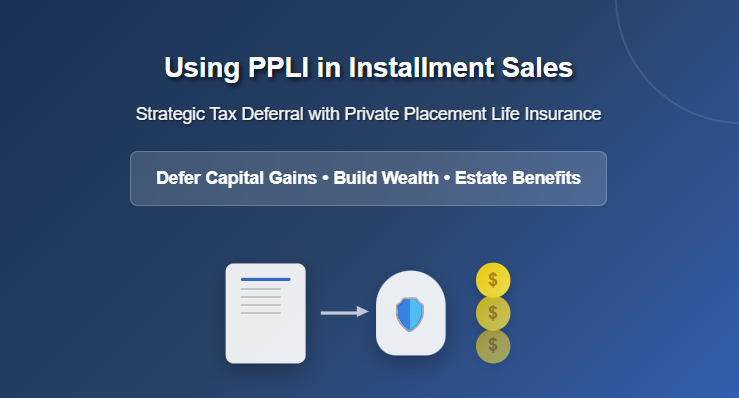High-net-worth individuals and business owners frequently face substantial capital gains tax obligations when selling appreciated assets. Private placement life insurance (PPLI) combined with installment sales presents a powerful tax planning strategy that can significantly defer and potentially reduce these tax burdens. This approach allows sellers to structure transactions that spread capital gains recognition over multiple years while building tax-advantaged wealth through PPLI policies.
Understanding Installment Sales and Capital Gains Deferral
An installment sale occurs when a seller receives payments for an asset over multiple tax years rather than as a lump sum. Under Section 453 of the Internal Revenue Code, sellers can recognize capital gains proportionally as they receive payments, effectively spreading the tax liability across the payment period. This method prevents sellers from being pushed into higher tax brackets in a single year and allows for better tax planning opportunities.
The installment method applies automatically to most asset sales unless the seller elects out of this treatment. For each payment received, a portion represents the original basis (not taxable), while another portion represents capital gain (taxable). This systematic approach to tax recognition creates opportunities to integrate additional wealth preservation strategies.
How Private Placement Life Insurance Works
Private placement life insurance represents a specialized form of life insurance designed for accredited investors with substantial assets. Unlike traditional life insurance products, PPLI policies offer access to institutional-quality investment options and provide significant customization in investment management. These policies combine life insurance protection with investment growth potential while maintaining favorable tax treatment.
PPLI policies allow policyholders to direct investments within the policy through separate accounts managed by professional investment managers. The insurance wrapper provides tax deferral on investment gains, tax-free policy loans, and death benefits that transfer to beneficiaries without income tax consequences. This structure makes PPLI particularly attractive for wealthy individuals seeking tax-efficient wealth accumulation and transfer strategies.
Integrating PPLI with Installment Sale Proceeds
When sellers receive installment payments over time, they can strategically direct these funds into PPLI policies to maximize tax benefits. As each installment payment is received, the seller recognizes the associated capital gain for that year. The after-tax proceeds from each payment can then fund PPLI premiums, creating a systematic approach to building tax-advantaged wealth.
This strategy works particularly well for sellers who do not need immediate access to the full sale proceeds. Instead of receiving a lump sum and facing immediate tax consequences, sellers can structure payments to align with their cash flow needs and tax planning objectives. The PPLI policy grows tax-deferred while providing life insurance protection and estate planning benefits.
Have Questions?
Contact us by filling the form, and we’ll get back to you soon!
Contact Us
Tax Advantages of the Combined Strategy
The integration of installment sales with private placement life insurance creates multiple layers of tax benefits. First, the installment sale spreads capital gains recognition over multiple years, potentially keeping the seller in lower tax brackets and reducing overall tax liability. Second, the PPLI policy provides tax-deferred growth on the invested proceeds, allowing for more efficient wealth accumulation than taxable investments.
Additionally, PPLI policies offer tax-free access to policy values through loans and withdrawals up to basis. This feature provides liquidity without creating additional taxable income. Upon the policyholder’s death, beneficiaries receive the death benefit income tax-free, creating significant wealth transfer advantages compared to other investment vehicles.
Practical Implementation Considerations
Successfully implementing this strategy requires careful planning and professional guidance. Sellers must structure installment sales to comply with tax regulations while achieving their financial objectives. The buyer’s creditworthiness becomes crucial since payments are received over time, and sellers may want to secure the installment obligations through collateral or guarantees.
PPLI policies must be properly designed to maintain their tax-advantaged status. This includes ensuring adequate life insurance coverage relative to the policy’s cash value and complying with modified endowment contract rules. Investment selection within the policy should align with the policyholder’s risk tolerance and long-term objectives while maximizing tax efficiency.
Ideal Candidates for This Strategy
This approach works best for wealthy individuals selling appreciated business interests, real estate, or other significant assets who do not require immediate access to the full sale proceeds. Candidates should have sufficient liquidity from other sources to meet their living expenses while installment payments fund PPLI premiums over time.
Business owners planning succession strategies often find this combination particularly attractive. They can sell their businesses through installment sales to family members or key employees while using the proceeds to build wealth through private placement life insurance. This approach facilitates business transitions while creating tax-efficient wealth accumulation and transfer opportunities.
Estate Planning Benefits
Beyond the immediate tax advantages, combining installment sales with PPLI creates significant estate planning benefits. The life insurance death benefit can replace the wealth transferred through the installment sale, ensuring heirs receive full value despite the seller’s consumption of sale proceeds during their lifetime. This replacement value comes to beneficiaries income tax-free, creating more efficient wealth transfer than most other strategies.
The installment sale removes the sold asset from the seller’s estate, potentially reducing estate tax liability. Meanwhile, the PPLI policy can be owned by an irrevocable life insurance trust, further removing the death benefit from the taxable estate while providing liquidity to pay estate taxes or replace transferred wealth.
Professional Guidance and Implementation
The successful execution of this strategy requires coordination among various professionals, including tax advisors, attorneys, insurance specialists, and investment managers. Each professional brings specialized expertise necessary to structure and implement these transactions properly while ensuring compliance with applicable regulations.
Tax advisors help optimize the timing and structure of installment sales to minimize overall tax liability. Attorneys draft sale agreements and trust documents that protect the seller’s interests while achieving tax planning objectives. Insurance professionals design PPLI policies that maximize tax benefits while providing appropriate insurance protection.
Conclusion
Using private placement life insurance in conjunction with installment sales creates a powerful strategy for deferring capital gains tax while building tax-advantaged wealth. This approach allows sellers to spread tax recognition over multiple years while systematically investing the proceeds in a tax-efficient vehicle that provides insurance protection and estate planning benefits.
For wealthy individuals facing significant capital gains from asset sales, this strategy offers a path to reduce immediate tax liability while creating long-term wealth accumulation opportunities. However, successful implementation requires careful planning and professional guidance to ensure all regulations are met and objectives are achieved. When properly executed, the combination of installment sales and PPLI can significantly enhance after-tax wealth while providing valuable insurance protection and estate planning benefits.
Ready to optimize your PPLI death benefit strategy?
Book a Call





0 Comments